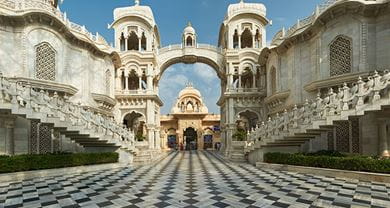- Trending:
- Pope Leo Xiv
- |
- Israel
- |
- Trump
- |
- Social Justice
- |
- Peace
- |
- Love

RELIGION LIBRARY
ISKCON (Hare Krishna)
Afterlife and Salvation
Like other Hindu sects, ISKCON accepts the doctrines of karma and reincarnation, meaning that a person's actions during the present life affects future rebirths. ISKCON defines karma as the universal law of cause and effect. Good actions lead to good reactions, and evil actions lead to evil reactions. Many of these reactions or effects occur during an individual's lifetime. One common example given by ISKCON involves the eating of meat, a violation of the movement's vegetarian principles. ISKCON teaches that meat eaters inculcate a sense of violence, uncaring, and anger around them because of their choice to eat meat, resulting in their own development as more violent, uncaring, and angry individuals. Furthermore, other people respond to that negative energy in equally negative manners, beginning a chain reaction of bad karma.
Yet karma extends far beyond the individual lifetime. The Hare Krishna movement teaches that a person's karma determines their future rebirths. To continue the example of the meat eaters, such individuals' karma would lead them to rebirth in states of violence, uncaring, and anger. They might be born as animals on factory farms destined for a lifetime of suffering and death, but it is also possible that they would be born as a carnivore, or even as a human being destined to work in a slaughterhouse.
As that example shows, although one can make general suppositions about the law of karma, in its specifics one cannot foretell the law of karma. For this reason, it behooves a person to avoid the vagaries of karma through appeal to the master of karma, Krishna. ISKCON devotees believe that living a life of devotion to Krishna not only means that one does not accumulate karma, but that through his mercy and grace, Krishna removes the karma of his devotees. In this regard, ISKCON stands with the more theistic branches of Hinduism that understand the divine as above the law of karma.
Rather than experience an earthly rebirth defined by past karma, a devotee who dedicates his or her life to a relationship with Krishna is reborn into Krishna's divine realms. ISKCON understands these realms as spiritual planets that exist on a higher plane of the universe. Numerous such planets exist, and all serve as eternal abodes of Krishna where devotees can experience the peace of rejoining their creator.
Devotees who engage in the highest forms of worship and love experience rebirth into the highest of Krishna's spiritual realms, Goloka. ISKCON looks to the Bhagavata Purana, particularly the commentary written by Bhaktivedanta, to describe the nature of Goloka. Bhaktivedanta explained it as a heavenly realm of perfection. Its inhabitants are eternal, content, and always at peace. In Goloka, Krishna exists in his form as the Supreme Personality of Godhead, Krishna the young prince who frolicked in the forest of Vrindaban. Devotees born into Goloka engage in the highest rasas, or modes of devotion (bhakti), frolicking alongside Krishna as his friends, playing with him as the love-struck gopis, or caring for him as parents.
Devotees who engage in lower but still exemplary forms of bhakti, such as shanta rasa, the rasa of reverence, and dasya rasa, the rasa of service, experience rebirth on the Vaikuntha planets, the other spiritual realms for devotees. On such planets Krishna appears in his various cosmic Vishnu forms, displaying his majesty to the devotees. ISKCON teaches that these planets, as spiritual realms, exhibit numerous heavenly qualities and none of the negative ones normally associated with materiality. On them the devotees engage in eternal service and adoration of Krishna.
While such spiritual realms offer eternal tranquility and the opportunity to rejoin Krishna, to go back to Godhead, ISKCON also accepts the reality of numerous other material planets throughout the cosmos, some better and some worse than the earth. A non-devotee might be reborn onto such a planet as a result of their karma. Some of these material planets exhibit characteristics similar to the spiritual heavens, such as physical beauty and spiritual tranquility, but none offers either eternal life or a true return to Godhead. Others are hellish places of torment, pain, and suffering. Individuals with particularly good karma might find themselves born onto a heavenly material realm, while those with exceptionally poor karma may experience a lifetime on a hellish planet. Yet neither sort of rebirth offers eternal solace or eternal damnation, for at the end of the reborn individual's (perhaps very long) lifetime, he or she experiences another transmigration. For a Hare Krishna devotee, only the path of bhakti offers a chance for everlasting rebirth onto a spiritual realm of Krishna.
Study Questions:
1. Why are many ISKCON members vegetarians?
2. How can Krishna change one's karma?
3. How do rasas influence rebirth?
4. Why is bhakti heavily emphasized?










